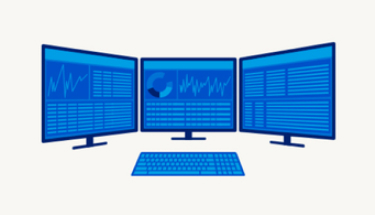
- Create new account

Market Research Analyst
Market research analysts study consumer preferences, business conditions, and other factors to assess potential sales of a product or service. They help companies understand what products people want, who will buy them, and at what price.
Market research analysts typically do the following:
- Monitor and forecast marketing and sales trends
- Measure the effectiveness of marketing programs and strategies
- Devise and evaluate methods for collecting data, such as surveys, questionnaires, and opinion polls
- Gather data on consumers, competitors, and market conditions
- Analyze data using statistical software
- Convert data and findings into tables, graphs, and written reports
- Prepare reports and present results to clients and management
Market research analysts gather data and study other information to help a company promote its products or services. They gather data on consumer buying habits, demographics, needs, and preferences. They collect data and information using a variety of methods, such as focus groups, interviews, literature reviews, market analysis surveys, public opinion polls, and questionnaires.
Analysts help determine a company’s position in the marketplace by researching their competitors and studying their marketing methods, prices, and sales. Using this information, analysts may determine potential markets, product demand, and pricing. Their knowledge of the targeted consumer enables analysts to develop advertising brochures and commercials, product promotions, and sales plans.
Market research analysts evaluate data using statistical techniques and software. They must interpret what the data mean for their client, and they may forecast future trends. They often make charts, graphs, infographics, and other visual aids to present the results of their research.
Workers who design and conduct surveys that market research analysts use are survey researchers.
Market research analysts held about 792,500 jobs in 2021. The largest employers of market research analysts were as follows:
Because most industries use market research, these analysts are employed throughout the economy.
Market research analysts work individually or as part of a team, collecting, analyzing, and presenting data. For example, some analysts work with graphic designers and artists to create charts, graphs, and infographics summarizing their research and findings.
Work Schedules
Most market research analysts work full time during regular business hours.
Market research analysts typically need a bachelor’s degree. Some employers require or prefer that job candidates have a master’s degree. Strong research and analytical skills are essential.
Market research analysts typically need a bachelor's degree in market research or a related business, communications, or social science field.
Courses in statistics, research methods, and marketing are important for prospective analysts. Courses in communications and social sciences, such as economics or consumer behavior, are also helpful.
Some employers of market research analysts require or prefer a master’s degree. Several schools offer graduate programs in marketing research, but analysts may choose to complete a bachelor’s degree in another field, such as statistics and marketing, and earn a master’s degree in business administration (MBA). A master’s degree is often required for leadership positions or positions that perform more technical research.
Licenses, Certifications, and Registrations
Analysts may pursue certification, which is voluntary, to demonstrate a level of professional competency. The Insights Association offers several certifications for market research analysts, including the IPC Principal and the IPC Masters. Candidates qualify based on industry experience and passing an exam.
Other Experience
Completing an internship while in school may be helpful. Prospective analysts also may gain experience by volunteering for an organization and helping with market research or related projects.
Employers may prefer to hire candidates who have experience in other positions that require collecting and analyzing data or writing reports to summarize research.
Market research analysts typically have an interest in the Thinking, Persuading and Organizing interest areas, according to the Holland Code framework. The Thinking interest area indicates a focus on researching, investigating, and increasing the understanding of natural laws. The Persuading interest area indicates a focus on influencing, motivating, and selling to other people. The Organizing interest area indicates a focus on working with information and processes to keep things arranged in orderly systems.
If you are not sure whether you have a Thinking or Persuading or Organizing interest which might fit with a career as a market research analyst, you can take a career test to measure your interests.
Market research analysts should also possess the following specific qualities:
Analytical skills. Market research analysts must be able to understand large amounts of data and information.
Communication skills. Market research analysts need strong communication skills when gathering information, interpreting data, and presenting results to clients.
Critical-thinking skills. Market research analysts must assess all available information to determine what marketing strategy would work best for a company.
Detail oriented. Market research analysts must be detail oriented because they often do precise data analysis.
The median annual wage for market research analysts was $63,920 in May 2021. The median wage is the wage at which half the workers in an occupation earned more than that amount and half earned less. The lowest 10 percent earned less than $37,570, and the highest 10 percent earned more than $128,320.
In May 2021, the median annual wages for market research analysts in the top industries in which they worked were as follows:
Employment of market research analysts is projected to grow 19 percent from 2021 to 2031, much faster than the average for all occupations.
About 99,800 openings for market research analysts are projected each year, on average, over the decade. Many of those openings are expected to result from the need to replace workers who transfer to different occupations or exit the labor force, such as to retire.
Employment growth will be driven by an increasing use of data and market research across many industries. These workers will be needed to help understand the needs and wants of customers, measure the effectiveness of marketing and business strategies, and identify the factors affecting product demand.
The increase in the collection and analyses of big data—extremely large sets of information, such as social media comments or online product reviews—can provide insight on consumer behaviors and preferences. Businesses will need market research analysts to conduct analyses of the data and information.
For more information about market research analysts, visit
Insights Association
For resources and information about qualitative research, visit
Qualitative Research Consultants Association (QRCA)
Where does this information come from?
The career information above is taken from the Bureau of Labor Statistics Occupational Outlook Handbook . This excellent resource for occupational data is published by the U.S. Department of Labor every two years. Truity periodically updates our site with information from the BLS database.
I would like to cite this page for a report. Who is the author?
There is no published author for this page. Please use citation guidelines for webpages without an author available.
I think I have found an error or inaccurate information on this page. Who should I contact?
This information is taken directly from the Occupational Outlook Handbook published by the US Bureau of Labor Statistics. Truity does not editorialize the information, including changing information that our readers believe is inaccurate, because we consider the BLS to be the authority on occupational information. However, if you would like to correct a typo or other technical error, you can reach us at [email protected] .
I am not sure if this career is right for me. How can I decide?
There are many excellent tools available that will allow you to measure your interests, profile your personality, and match these traits with appropriate careers. On this site, you can take the Career Personality Profiler assessment, the Holland Code assessment, or the Photo Career Quiz .
Get Our Newsletter
CAREER PATHWAYS
Looking for the perfect job? Explore our Career Guides!
How to Become a Market Research Analyst
By Alyciah Beavers
Published: March 19, 2024
In today’s ever-evolving business landscape, organizations strive to make informed decisions that will propel them toward success, and this is where a market research analyst role is crucial. The career suits anyone who wants to become a master of data, a sleuth of consumer behavior, and a guardian of market insights. Read on to understand what is a market research analyst and if this career might be the right choice for you.
Career Summary
Market research analyst salary.

Here is a general trajectory of market research analyst salary, according to Glassdoor.com :
- Entry Salary (US$56k)
- Median Salary (US$71k)
- Executive Salary (US$100k)
To put this into perspective, the annual average wage for all occupations in the US is $61,900 . This means that, based on your level, you can make some excellent cash as a market research analyst.
Market Research Analyst Job Description
So, what does a market research analyst do? A market research analyst collects, analyzes, and interprets data to provide insights and recommendations on market trends and consumer behavior to a business . Their main objective is to help businesses make informed decisions regarding their products, services, and marketing strategies. Additionally, a market research analyst conducts market analysis and assists companies in understanding the products people want and how to price them.
Market Research Analyst Career Progression
- Entry-Level Analyst: It is the starting point for most market research analysts. At this stage, your roles involve assisting more senior analysts in conducting research, collecting data, and analyzing market trends. Your role also entails preparing reports and presentations.
- Research Analyst: You have more independence and take on greater responsibility for designing research methodologies, managing data collection, and conducting analysis.
- Senior Analyst: You have a deeper understanding of market research methodologies, advanced analytical techniques, and industry-specific knowledge.
- Supervisor: Here, your role involves overseeing multiple research projects, managing a team of analysts, and contributing to high-level decision-making. You are responsible for resource allocation, project planning, and client management.
- Head of Market Research: You are responsible for shaping the overall research strategy, guiding the research team, and collaborating with senior executives to align research efforts with business goals. You are also involved in budgeting, business development, and fostering relationships with clients and stakeholders.

- It simulates intellectual intelligence, where you develop your critical and problem-solving skills.
- It gives you the proper industry exposure since you work with clients from diverse industries.
- The career offers continuous learning opportunities since market research is a rapidly evolving field.
- As a marketing analyst, you can comfortably tackle complex business problems.
- It offers a collaborative environment where you work as a team with other people, such as marketing professionals, statisticians, data scientists, and business executives.
- Some tasks are monotonous as they involve collecting and analyzing large amounts of data, which can sometimes be tedious.
- Market research often operates on tight deadlines, requiring analysts to work under pressure to meet project timelines.
- At times there is limited creativity, whereby some analysts may feel constrained when developing innovative solutions or exploring unconventional approaches.
- The industry is competitive, so analysts need to stay updated constantly on the trends and consumer behaviors.
- There is a lot of data overload, which is overwhelming and challenging to navigate.
Useful Skills to Have As a Market Research Analyst
As a market research analyst, several useful skills can enhance your abilities and contribute to your success in the field, including:
- Research and Analytical Skills
- Data Interpretation and Statistical Analysis
- Critical Thinking Skills
- Strong Communication Skills
- Problem-Solving Abilities
- Technological Proficiency
Popular Market Research Analyst Specialties
Market research analysts specialize in various areas depending on the industry and the specific needs of their clients or employers.
There are some popular specialties within the field of market research analysis:
- Consumer Behavior
- Market Segmentation
- Competitive Analysis
- Brand Research
- Product Development
- Market Trend Analysis
How to become a Market Research Analyst

The right way to become a market research analyst is through education, relevant work experience, and specific skills. While the exact path can vary depending on individual circumstances, here are some common steps to help you pursue a career in market research analysis.
Obtain a Degree in a Relevant Field
Do i need a degree to become a market research analyst.
While having a degree is not always a strict requirement to become a market research analyst, it can significantly enhance your prospects and competitiveness in the job market. Many employers prefer candidates with a bachelor’s degree, particularly in fields such as market research, business administration, statistics, economics, or social sciences .
Why Is It Important to Get A Degree In Market Research or a Related Field?
While it’s not always a strict requirement, obtaining a degree offers numerous advantages. A relevant degree equips you with the foundational knowledge and analytical skills necessary for market research analysis, as well as the skills to analyze complex data sets, use statistical tools and software, and derive meaningful conclusions.
A degree program can provide a comprehensive understanding of research methodologies, statistical analysis, consumer behavior, data interpretation, and marketing principles. These skills are essential for conducting adequate market research and making informed decisions based on the collected data.
Furthermore, some employers may specifically request a degree or prefer candidates with higher qualifications for specific positions or in highly competitive job markets.
Additionally, having a degree can serve as evidence of your commitment, discipline, and ability to acquire and apply knowledge, which can be valuable to potential employers.
How Long Does It Take To Get A Degree?
The duration of a degree program in market research analysis can vary depending on several factors, including the degree level and the educational institution’s structure:
- Associate’s Degree: An associate’s degree generally takes around two years to complete . This program provides a foundational understanding of market research principles and techniques.
- Bachelor’s Degree: A bachelor’s degree typically requires four years of full-time study . Students delve deeper into market research methodologies, data analysis, and related business courses during this program.
- Master’s Degree: Pursuing a master’s degree in market research takes two years beyond the bachelor’s degree . This program focuses on advanced research techniques, data analysis, consumer behavior, and marketing strategy.
- Doctoral Degree: A Ph.D. or doctoral degree in market research analysis can take an additional four to six years of study beyond the master’s degree . The programs emphasize research, theory development, and advanced methodologies. These degrees are more suited for individuals interested in academic or research-oriented careers.
How Much Does It Cost to Study Market Research Analysis at University?
The cost of studying market research analysis at a university can vary widely depending on factors such as the country, the specific university, the level of study, undergraduate or postgraduate. Additionally, tuition fees can change over time, so it’s essential to check with the specific university or college for the most accurate and up-to-date information. Here is a breakdown as of 2022:
- Undergraduate marketing research program tuition for an in-state student is US$12,020, while an out-of-state student pays US$28,345.
- A graduate market research in-state student pays US$13,864, while an out-of-state student pays US$24,560.
Can I become a Market Research Analyst Through Online Education?
Yes, online education makes it possible to become a market research analyst . The web offers numerous resources and programs in multiple fields, including market research, with flexible learning hours.
Look for accredited online courses, certificate programs , or degree programs in market research, marketing, business, statistics, or related fields. Ensure that the program you choose is from a reputable institution.
Gain Practical Experience
Practical experience complements theoretical knowledge and helps you demonstrate your skills and abilities to potential employers. Seeking opportunities to apply your knowledge and skills in realistic settings and continuously striving to expand your expertise through hands-on experience in market research is the only way to go. Some ways involve volunteering and interning in different corporations to gain hands-on experience.
What are Internship Opportunities for A Market Research Analyst?
As a market research analyst, several internship opportunities are available to gain practical experience and develop your skills.
Here are some potential avenues to explore:
- Market Research Firms: Many market research companies offer internship programs tailored explicitly for aspiring analysts. These firms research for various clients and industries, exposing interns to multiple projects and methodologies.
- Corporate Internships: Numerous companies, especially larger ones, have in-house market research departments. These organizations often offer internships to support their research activities, allowing you to work directly with their marketing teams and gain industry-specific insights.
- Advertising and Marketing Agencies: Advertising and marketing agencies frequently require market research to inform their strategies and campaigns. Interning with such agencies can expose you to diverse projects and clients, enhancing your understanding of how research drives marketing decisions.
- Technology Companies: Tech companies, particularly those involved in data analytics and consumer insights, often offer internships for market research analysts. These opportunities can provide exposure to innovative tools, techniques, and datasets, allowing you to develop skills in the intersection of technology and market research.
- Consulting Firms: Consulting firms may have market research divisions or projects to which interns can contribute. These firms work with clients to provide strategic advice; market research is critical to their decision-making processes.
- Government Agencies: Government agencies often conduct market research to inform policy decisions, public campaigns, and program evaluations. Interning with a government agency can provide insights into the unique challenges and considerations of conducting research within the public sector.
To find internship opportunities , consider exploring online job boards, company websites, and professional networking platforms and contacting your university’s career services department. Networking with professionals in the field, attending industry events, and joining relevant market research associations or groups can also help you discover internship opportunities.
What Skills Will I Learn As A Market Research Analyst?
As a market research analyst, you will develop various skills to effectively gather, analyze, and interpret data to support business decision-making.
Here are some essential skills you can expect to learn and enhance in this role:
- Research Design: You will learn how to design research studies and formulate appropriate research questions and objectives.
- Data Collection: You will acquire skills in collecting data through surveys, interviews, focus groups, and observational studies. This includes developing questionnaires, conducting interviews, and managing data collection processes.
- Data Analysis: You will gain proficiency in analyzing data using statistical techniques, data visualization tools, and software packages like Excel, SPSS , or R . This involves interpreting quantitative and qualitative data, identifying patterns and trends, and drawing meaningful insights.
- Market Analysis: You will learn to assess market trends, customer behavior, and competitive landscapes. This includes conducting competitor analyses, market segmentation, and identifying target markets.
- Report Writing: You will develop strong written communication skills to effectively communicate research findings and insights through reports, presentations, and visualizations. This involves summarizing complex data into clear and actionable recommendations.
- Critical Thinking: You will enhance your ability to think critically and analytically, evaluate research methodologies, assess data quality, and identify potential biases or limitations in research findings.
- Problem-Solving: As a market research analyst, you will learn to identify business problems, formulate research objectives, and develop strategic solutions based on data-driven insights.
- Collaboration: You will develop teamwork and collaboration skills, as market research often involves working with cross-functional teams, stakeholders, and clients to understand their needs and deliver actionable results.
- Technology and Tools: You will become proficient in utilizing market research tools, software, and technologies to enhance data collection, analysis, and reporting. This may include data analytics platforms, survey software, CRM systems , and visualization tools.
- Industry Knowledge: You will gain deep knowledge and understanding of the industry or market you are researching, including key trends, regulations, and emerging opportunities.
What are Some Web Resources to Learn Skills to Become a Market Research Analyst?
Several web resources can help you acquire the necessary knowledge and skills.
Here are some useful platforms and websites you can explore:
- MarketResearch.com : This website offers various market research reports and articles covering multiple industries. It can help you understand different research methodologies, industry trends, and analysis techniques.
- GreenBook : GreenBook provides a platform for market research professionals and offers industry news, reports, webinars, and online resources. It covers topics such as research techniques, data analysis, and emerging trends in the field.
- American Marketing Association (AMA) : The AMA website provides valuable resources and tools for marketers, including market research-related content. It offers articles, white papers, webinars, and events that enhance your understanding of market research concepts and practices.
- Research Association (ESOMAR) : ESOMAR is a global association for market, opinion, and social research professionals. Their website offers a comprehensive library of resources, including industry reports, webinars, and guidelines for conducting market research.
- Quirks : Quirks is a website that offers market research articles, case studies, and industry news. It covers various topics like survey design, data analysis, and emerging methodologies. They also have a directory of market research vendors and services.
- Research World : Research World is an online publication covering recent trends and developments in the market research industry. It provides articles, case studies, and insights from industry experts, which can be valuable for learning and staying updated.
Obtain Certifications
Consider pursuing additional certifications or courses in market research, data analysis, or relevant areas to enhance your knowledge and marketability. While there is no single universal certification for market research analysts, several reputable organizations offer certifications that can enhance your credentials.
Some popular certifications include:
- Certified Market Research Professional (CMRP) : This is a widely recognized certification that demonstrates a market research analyst’s expertise in research methodologies, ethics, and data analysis. It signifies a commitment to high professional standards and best practices in the field. Earning the CMRP can enhance your credibility, increase your chances of landing job opportunities, and potentially lead to higher earning potential.
- Professional Researcher Certification (PRC) : The PRC certification validates a market researcher’s knowledge, skills, and ethical practices. It covers a broad range of market research topics, including research design, data collection, analysis, and reporting. Holding the PRC designation demonstrates your commitment to professional excellence and adherence to industry standards.
- Google Analytics Individual Qualification (GAIQ) : While not specific to market research, the GAIQ certification is highly relevant for market research analysts who deal with website data and analytics. It showcases proficiency in using Google Analytics, a widely used tool for analyzing website traffic and user behavior. GAIQ certification can be valuable in demonstrating your ability to interpret web data, track consumer interactions, and optimize online marketing strategies.
It’s important to note that, to take the exam and become certified, you must meet eligibility requirements. Some might require a bachelor’s degree in a relevant field such as marketing, business, or statistics and a specific number of years of experience working in market research or a related area.
What’s the Career Outlook for Market Research Analysts?
As of 2021, the career outlook for market research analysts is generally positive, and the field will continue to experience steady growth. Researchers estimate that there will be a 19% growth from 2021 to 2031, which is way faster than any other occupation.
However, please note that economic and industry trends can change over time, so it’s always a good idea to consult up-to-date sources and labor market data for the most accurate information.
Some of the factors contributing to the positive career outlook for market research analysts include:
- Increasing Demand: With the rise of technology and data-driven decision-making, there is a growing need for skilled professionals who can interpret and analyze market data. Businesses across various industries rely on market research to gain a competitive edge, expand their customer base, and identify new market opportunities.
- Globalization and International Markets: As companies expand their operations globally, understanding diverse markets and consumer behaviors becomes crucial. Market research analysts with expertise in international markets and cultural nuances can offer valuable insights and are in high demand.
- Emphasis on Data-Driven Decision-Making: Organizations increasingly rely on data to drive their strategies in today’s data-driven business landscape. Companies seek market research analysts who can effectively collect, analyze, and interpret data using advanced analytical tools and techniques.
- Technological Advancements: Advancements in technology, such as big data analytics, artificial intelligence, and machine learning, are revolutionizing the field of market research. Professionals who can adapt to these technological changes and utilize them to extract actionable insights will likely have strong career prospects.

What Are The Job Opportunities Of A Market Research Analyst?
Market research analysts have a wide range of job opportunities across various industries. Their primary responsibility is to gather and analyze data to help organizations make informed business decisions.
Luckily, there are many other job opportunities within the field of market research analysis that a market research analyst can do:
- Market Research Analyst: This is the primary role of a market research analyst where they collect and analyze data to identify market trends, consumer behavior, and competitive landscape. They design surveys, conduct interviews, and use statistical techniques to interpret the data and generate actionable insights for decision-making.
- Market Intelligence Specialist: In this role, you would focus on gathering and analyzing data related to the industry, competitors, and market conditions. You would monitor market trends, track competitor activities, and provide strategic recommendations to support business development, product positioning, and market entry strategies.
- Consumer Insights Analyst: As a consumer insights analyst, you would delve into understanding consumer behavior, preferences, and attitudes. You would employ various research methods such as surveys, focus groups, and interviews to gather data and then analyze it to uncover consumer insights. These insights help companies develop effective marketing strategies and refine product offerings.
- Data Analyst : Data analysis is an essential aspect of market research, and as a data analyst, you would specialize in processing, organizing, and interpreting large datasets. You would use statistical techniques, data mining, and visualization tools to extract meaningful patterns and trends. Your findings would assist in making informed business decisions and optimizing marketing campaigns.
- Market Research Consultant: In a consulting role, you would work with clients from different industries to provide expert market research guidance. You would conduct comprehensive market studies, assess competitive landscapes, and deliver strategic recommendations based on your analysis. Consultants often work on a project basis and collaborate closely with clients to address specific business challenges.
- Brand Strategist: Brand strategists combine market research insights with creative thinking to develop and implement effective branding strategies. You would analyze consumer perceptions, market positioning, and competitive landscape to define brand identities, messaging, and marketing campaigns that resonate with target audiences.
What Type Of Companies Hire A Market Research Analyst?
Market research analysts are in demand across various industries and sectors.
Some of the companies that hire market research analysts include:
- Market Research Firms: These specialized firms conduct market research for clients across different industries.
- Consumer Goods Companies: Companies that produce and sell consumer goods often employ market research analysts to gather insights on consumer preferences, market trends, and product performance.
- Technology Companies: Technology companies, especially those involved in software development, electronics, and telecommunications, rely on market research analysts to understand customer needs, evaluate competition, and assess market potential.
- Healthcare and Pharmaceutical Companies: These companies require market research analysts to study patient demographics, evaluate the efficacy of drugs, analyze healthcare trends, and assess market opportunities.
- Financial Institutions: Banks, insurance companies, and investment firms hire market research analysts to analyze market trends, identify investment opportunities, and assess customer preferences.
- Advertising and Marketing Agencies: Agencies that offer advertising, branding, and marketing services often have market research analysts on their teams to provide insights for developing effective strategies and campaigns.
- Retail Companies: Retailers employ market research analysts to understand consumer behavior, analyze purchasing patterns, and identify market opportunities.
- Media and Entertainment Companies: Media companies, including television networks, film studios, and streaming platforms, use market research analysts to understand audience preferences, gauge viewership, and identify potential content opportunities.
What Is The Work-Life Balance Of A Market Research Analyst?
A market research analyst’s work-life balance can vary depending on company culture , industry, workload, and personal preferences. Generally, market research analysts strive to maintain a balanced lifestyle, but the actual balance achieved can differ from person to person.
The working hours of market research analysts involve standard office hours, 9 am to 5 pm, or similar. However, there may be times when they need to perform additional hours to meet project deadlines or during busy periods. Therefore, this affects how these individuals maintain their work and social life.
However, there is also a lot of flexibility in this job. Depending on the company and specific job requirements, market research analysts may have some flexibility in their work arrangements. This could include options for remote work , flexible schedules, or compressed work weeks. Flexibility can contribute positively to achieving a better work-life balance.
The workload varies based on the organization’s demands and the projects involved at different quarters of the year. There may be periods with high-intensity work where you should meet the deadlines, which could affect your work-life balance. However, there may also be quieter periods with a more manageable workload. Balancing workload, managing deadlines, and effectively communicating with stakeholders can help alleviate stress and improve work-life balance.
Personal factors such as individual preferences, commitments, and priorities significantly affect work-life balance. Some market research analysts may prioritize their personal lives, hobbies, or family time more, while others may focus more on their careers. Individuals must assess and prioritize their needs to achieve the desired work-life balance.
Ultimately, achieving a good work-life balance as a market research analyst involves finding a suitable position with a supportive company culture, managing workload and stress effectively, and establishing personal boundaries to ensure time for personal life outside of work.
Should I become a Market Research Analyst?
If you have a passion for market research, understanding market trends, and delving into the factors that influence consumers’ life decisions, this is the perfect career for you. It’s important to make an informed decision based on your interests, skills, and long-term goals. Notably, there will be over 99,800 job openings for market research analysts each year for the next decade leading to this job increase. Therefore, if you’re looking to invest in a promising career for the future, this is the ideal path to pursue.
Careers Related to Market Research Analyst
- Business Analyst
- Data Analyst
- Marketing Manager
- Product Manager
- Sales Manager

About the Author
Read more articles by Alyciah Beavers
Continue Reading
What is a UX Designer and How to Become One
What is a machine learning engineer and how to become one, what is a ui designer and how to become one, what is an seo specialist and how to become one, what is a recruiter and how to become one, what is a project manager and how to become one, what is a front-end developer and how to become one, what is a product manager and how to become one.
Market Research Analyst Overview
Overall Score 5.7 / 10
- # 7 in Best Business Jobs
- # 27 in 100 Best Jobs
What is a Market Research Analyst ?

- Communicating with stakeholders and participating in meetings.
- Analyzing data and creating visualizations.
- Ensuring project timelines are met.
- Monitoring sales trends.
Market Research Analysts rank # 7 in Best Business Jobs . Jobs are ranked according to their ability to offer an elusive mix of factors. Read more about how we rank the best jobs.
- Job Market 4.6
- Future Growth 8.1
- Work Life Balance 4.8
How Much Does a Market Research Analyst Make?
Job satisfaction.
Average Americans work well into their 60s, so workers might as well have a job that's enjoyable and a career that's fulfilling. A job with a low stress level, good work-life balance and solid prospects to improve, get promoted and earn a higher salary would make many employees happy. Here's how Market Research Analysts job satisfaction is rated in terms of upward mobility, stress level and flexibility.
Opportunities for advancements and salary
Work environment and complexities of the job's responsibilities
Alternative working schedule and work life balance
Kara Coleman Fields
Kara Coleman Fields is an editor and writer on the Advice Products team, where she works on projects including Best Companies to Work For and Best Jobs. Previously, she wrote and edited SkillBuilder, loans and credit cards content for U.S. News. Prior to joining U.S. News, she worked for news outlets in Alabama and Tennessee. Read more
How to Become a Market Research Analyst ?
U.s. news best jobs.

Online Students
For All Online Programs
International Students
On Campus, need or have Visa
Campus Students
For All Campus Programs
What Does a Market Research Analyst Do?

Understanding the Numbers When reviewing job growth and salary information, it’s important to remember that actual numbers can vary due to many different factors — like years of experience in the role, industry of employment, geographic location, worker skill and economic conditions. Cited projections do not guarantee actual salary or job growth.
Big data is big business.
That's why there's a need for employees who can work with data. And there are plenty of job titles in the workforce for people who take on this work. One of them? Market research analysts.
So who are these people?

White teaches at the graduate level at SNHU, guiding students through Advanced Marketing Research and Analytics as well as their capstone course. Before he made the shift to higher education, he was director of operations — which involved a considerable amount of market needs assessment research — for one of the largest fast-food restaurant chains in the country.
In studying the data, White says, you attempt to uncover customer needs and wants in an attempt to understand the products or services that the target market wants.
What Does a Market Research Analyst Do on a Daily Basis?

"The market research analyst is responsible for monitoring and forecasting various trends in order to gauge the effectiveness of marketing campaigns," said Dr. Lester Wills , an SNHU adjunct instructor.
Wills previously managed the marketing divisions of several multinational corporations in Australia, where he and his teams conducted market research as an integral part of marketing programs. He also has led several research programs and headed up a task force for the main financial services industry body in Australia. Today, Wills teaches several graduate-level marketing courses at SNHU, including Market Research, Advanced Market Research and Analytics, and Ethical and Legal Issues in Marketing.
So what exactly can you expect in an analyst role?
The median market research analyst salary in May 2022 was $68,230 , according to the BLS: That's 47% more than the median wages for all workers across the U.S.*
(It's good to note that the BLS states that the highest 10% received more than $131,850 as a median salary in 2022 — earning 6 figures is possible in this field.)*
And 3 industries each had median salaries above the median for all market research analysts, according to the BLS:
- Management of companies and enterprises*
- Information*
- Finance and insurance*
What Qualifications Do You Need to Be a Market Analyst?
There's one question that you might have when considering the career: "Do market research analysts use math?"
Great news if you're not a fan:
"Good math skills are certainly helpful, because the market research analyst is heavily involved in statistical analysis of data," White said. "However, today’s modern statistical software performs all of the mathematical calculations for you."
Wills agreed.
"Given there are both quantitative and qualitative aspects to the role, a mix of skills is essential," he said. "You do not need to be good at math to be able to conduct qualitative research. However, some basic math skills are required for the quantitative research."
If a number of skills are needed to analyze market research, what should you study?
Fortunately, there are a number of college degree programs that can help you achieve your goal. Between White and Wills, their suggestions for bachelor's degrees and focused courses include:
- Business Administration
An undergraduate degree can help you get the job, though you'll want to note that some employers may require a master's degree, Wills said.
Plus, BLS states that market research analysts are in demand — so when you graduate, you could see more openings here than in a number of other fields.*
According to the BLS, over 115,000 new jobs are projected to be added to the workforce through 2032.* (That's a 13% increase in roles, over 4 times the average growth rate for all occupations!)*
White confirms that analysts are sought-after roles: "Companies continue to need knowledge regarding customer behavior in order to gain or maintain their competitive advantage in the marketplace," he said.
Find Your Program
What is the difference between market research and market analysis.
In your job search, you may see "market research" and "market analysis" as separate functions. And that's because they are.
"Market research primarily focuses on data directly from the market and customers," Wills said. "It looks to utilize consumer behavior and economic trends to confirm business ideas. It is focused on primary research."
It can work hand in hand with the analysis tasks.
"Market analysis is a form of secondary research and tends to be focused on a particular sector or niche in the market to try and answer specific questions," Wills said. "The research can be used to gain an understanding of how particular products and services are likely to perform in a certain environment."
Is a Market Research Analyst a Good Job?
Choosing to become a market research analyst can be an exciting decision — and one that can allow you to have an impact in your company.
"You have the opportunity to interface directly with consumers in the marketplace, collect and analyze data," White said. "And you get to report the results of your data and recommendations to marketing decision-makers within an organization."
Wills shared this view.
"If you love trying to understand consumer behavior and/or predict trends in the market, it can be a great role, since an analyst will help companies make important decisions," he said.
A degree can change your life. Find the SNHU business program that can best help you meet your goals.
*Cited job growth projections may not reflect local and/or short-term economic or job conditions and do not guarantee actual job growth. Actual salaries and/or earning potential may be the result of a combination of factors including, but not limited to: years of experience, industry of employment, geographic location, and worker skill.
Deidre Ashe was 9 years old when she launched her professional writing career. While spending a day at work with her dad, she penned her first book, illustrated it and sent it off to a publishing company – after finding the address on the copyright page of one of her paperbacks. While the story never made it to the shelves of libraries, the editors wrote back, encouraging her to continue pursuing her writing passion. (Yes, she still has that letter.)
After earning a bachelor’s in journalism, Ashe spent a decade working in the media industry. She then transitioned into marketing, later getting her MA in Communication from Southern New Hampshire University in 2018.
Ashe serves as senior copy director at SNHU. She and her family live in New Hampshire. Connect with Ashe on LinkedIn .
Explore more content like this article

SNHU Spotlight: Jeffrey Harris, MBA Grad

SNHU Spotlight: Luis Polanco, BS in Business Administration Grad

SNHU Spotlight: Lynda Jarrett, BS in Business Administration Grad
About southern new hampshire university.

SNHU is a nonprofit, accredited university with a mission to make high-quality education more accessible and affordable for everyone.
Founded in 1932, and online since 1995, we’ve helped countless students reach their goals with flexible, career-focused programs . Our 300-acre campus in Manchester, NH is home to over 3,000 students, and we serve over 135,000 students online. Visit our about SNHU page to learn more about our mission, accreditations, leadership team, national recognitions and awards.
- Book a Speaker
Lorem ipsum dolor sit amet, consectetur adipiscing elit. Vivamus convallis sem tellus, vitae egestas felis vestibule ut.
Error message details.
Reuse Permissions
Request permission to republish or redistribute SHRM content and materials.
Market Research Analyst
Job summary:.
The Market Research Analyst will research, compile, and analyze information on products and market conditions to identify potential new markets, sales opportunities, and the most effective methods of marketing specified products.
Supervisory Responsibilities:
Duties/responsibilities:.
- Identifies and defines the objective of an assigned marketing research project; determines the best methods to use to meet those objectives.
- Drafts questionnaires, polls, surveys, and other data collection resources.
- Researches and compiles data related to current product market, customer demographics and interest, and factors influencing product demand; analyzes results to identify ways of maximizing sales and market penetration of current products.
- Compiles data related to competitors products such as pricing, sales, and marketing or distribution methodology.
- Summarizes and analyzes data; makes recommendations related to research findings.
- Reports findings, complete with graphs illustrating data and written text explaining complex findings.
- Identifies potential new products or markets through research.
- Forecasts and tracks industry marketing and sales trends based on collected data.
- Delivers reports and presentations of findings to management and/or executive leadership.
- Performs other related duties as assigned.
Required Skills/Abilities:
- Excellent verbal and written communication skills.
- Excellent organizational skills and attention to detail.
- Superior research and analytical skills.
- Ability to translate complex concepts and methodologies into easily understood language.
- Proficient with Microsoft Office Suite or related software.
Education and Experience:
- Bachelors degree in Marketing Research, Statistics, Math, or related field required; MBA preferred.
- Some related experience preferred.
Physical Requirements:
- Prolonged periods sitting at a desk and working on a computer.
- Must be able to lift up to 15 pounds at times.
Related Content

Rising Demand for Workforce AI Skills Leads to Calls for Upskilling
As artificial intelligence technology continues to develop, the demand for workers with the ability to work alongside and manage AI systems will increase. This means that workers who are not able to adapt and learn these new skills will be left behind in the job market.

Employers Want New Grads with AI Experience, Knowledge
A vast majority of U.S. professionals say students entering the workforce should have experience using AI and be prepared to use it in the workplace, and they expect higher education to play a critical role in that preparation.
Advertisement

Artificial Intelligence in the Workplace
An organization run by AI is not a futuristic concept. Such technology is already a part of many workplaces and will continue to shape the labor market and HR. Here's how employers and employees can successfully manage generative AI and other AI-powered systems.
HR Daily Newsletter
New, trends and analysis, as well as breaking news alerts, to help HR professionals do their jobs better each business day.
Success title
Success caption
Market research analyst work environment
We surveyed 2,927 market research analysts to better understand the work environment and required skills of a typical market research analyst. Here are the results.
How much intelligence is required as a market research analyst?
Working as a market research analyst typically doesn’t require the use of high levels of intelligence in daily tasks.
Can I learn to become a market research analyst?
Intrinsic talent, acquired talent.
A career as a market research analyst typically depends predominantly on qualities you can gain through experience, with a small aspect of skills you are born with.
Is it easy to get a job as a market research analyst?
It’s typically difficult to find a job as a market research analyst. If you’re curious about the numbers, check out the job market for market research analysts .

Do market research analysts work full-time or part-time?
80% of market research analysts work in full-time roles while 20% work part-time.
Is being a market research analyst stressful?
Stress is not uncommon amongst market research analysts, with daily work sometimes being quite demanding.
Is being organized important as a market research analyst?
Some level of organization is generally required to be a market research analyst.
How competitive is the workplace for market research analysts?
Competition at work is not common for market research analysts.
Does being a market research analyst require frequent time pressure to complete tasks?
Market research analysts will have to sometimes face time pressure on the job.
Are market research analysts allowed to express themselves creatively?
Market research analysts rarely get a chance to express themselves creatively.
Do market research analysts have control over the direction of their work?
Market research analysts tend to have a set and inflexible work schedule that they are unable to deviate from too much.
Is being a market research analyst physically demanding?
Work as a market research analysts is rarely physically demanding, making it a suitable option for those unable to perform physically strenuous tasks.
Are market research analysts exposed to a wide variety of work?
While sometimes repetitive, market research analysts tend to have opportunities for variety in their work.
Does being a market research analyst require attention to detail?
As in many careers, attention to detail is quite helpful for market research analysts.
Does being a good market research analyst require compassion and empathy?
The ability to be compassion and empathetic isn't considered fundamental to success as a market research analyst.
We use cookies on our website to support technical features that enhance your user experience, and to help us improve our website. By continuing to use this website, you accept our privacy policy .
- Student Login
- No-Cost Professional Certificates
- COVID-19 Response
- Call Us: 888-549-6755
- 888-559-6763
- Search site Search our site Search Now Close
- Request Info
Skip to Content (Press Enter)
What Is a Market Research Analyst? Surveying This Data-Driven Career
By Carrie Mesrobian on 05/17/2021

You’ve just completed a purchase online. Suddenly, a window pops up, asking if you would like to rate your experience with a short survey. Since completing the survey will earn you a coupon for 10 percent off of your next purchase, you buzz through the simple questions and get on with your day.
But where your experience ends, the market research analyst’s has only just begun. All of those surveys go somewhere. And while a computer can pull a graph showing how many customers rated their experiences as “satisfying,” it takes a professional to ask questions that will result in meaningful answers—and to interpret those answers in a useful way.
Surveys are just a portion of the work market research analysts do.
“Market research is a lot more than simple dissection and analysis,” says Saud Ibrahim, digital marketing manager at The Jacket Maker . This career has a whole lot going for it—though many people haven’t given it a second thought. In this article, we’ll dig into what a market research analyst is, their role in the field and what you’ll need to become one.
So what is a market research analyst?
The simple answer is market research analysts help companies understand what products or services people want and what those people are willing to pay for them.
But the broader scope of the career is to examine market conditions for potential sales of a product or service, according to the Bureau of Labor Statistics (BLS). 1 That research can take on many forms—as long as it helps a company understand their industries and audiences, market their products effectively, and maximize their profits.
“The consumer marketplace is constantly growing and evolving,” says Katie Zmijewski, lead analyst at Market Strategies International . “As businesses are trying to keep up and look for new ways to engage their customers, they look to market research for insights that can inform their business decisions.”
What does a market research analyst do?
“Market researchers are tasked with making insights easily digestible, visually appealing and actionable for clients,” Zmijewski says. “Oftentimes, this requires us to be analytical and creative at the same time.”
Market research analysts monitor and predict sales trends, measure how effective campaigns are, and brainstorm new ways to gather data and find meaningful information, according to the BLS. 1
Arthur Iinuma, cofounder and president of ISBX , says that market research analysts need expertise in statistics, information technology and statistical software. Iinuma adds, “They should have an interest in psychology and excellent spoken and written communication skills.”
Market research analysts must also stay on top of current news and events, says Saksham Sharda, chief information officer at Outgrow . Additionally, some market research professionals devote a lot of their time into crafting methods of information gathering. Sharda explains that interactive quizzes, forms, surveys, polls, contests and estimators are all ways marketing professionals can provide useful information to consumers in exchange for market data.
Research is only the beginning, of course. A major challenge of the job is to give clients actionable insights when the research objective can be fairly open-ended to begin with. Zmijewski says building relationships with clients, learning about their internal team dynamics, and studying objectives and needs can help ease this challenge.
Market research analyst job outlook
While the day-to-day work might sound interesting to you, it’s still important to know some of the economic fundamentals of a role before making any career plans. The outlook for this occupation is positive. The BLS projects employment of market research analysts to grow 18 percent through 2029—an increase of roughly 130,300 jobs. 1
The reason for this growth lies in the rocketing increase of data as a source for reliable business decisions and direction across all industries, according to the BLS. 1 As companies learn to prize data-driven everything, they will be more and more likely to employ market research analysts who can collect, analyze and make sense of the information.
What skills do market research analysts need?
Analytical skills are certainly a huge part of the career—it’s even in the title! And as you might expect, the BLS lists analytical abilities in dealing with large amounts of information as the top skill most professionals need in this job. 1 But that’s not all you’ll need to succeed. We’ve asked market research professionals to offer up a few other skills that are crucial for market research analysts—and some may surprise you!
Storytelling
Market research analysis is not just deciphering what consumers are seeking—you need to be able to make inferences and draw conclusions based on consumer data. The job not only is about reporting the percentage of people who respond to a certain characteristic in a product—it’s to better understand and explain why.
“We are modern-day storytellers,” Zmijewski says. “We take interviews and numbers and translate them into meaningful recommendations for our clients to act on.”
Being able to accurately assess data and weave together a coherent narrative to potentially explain the “why?” surrounding it is key. Decision-makers often rely on an analyst’s ability to interpret and synthesize information.
Communication and interpersonal skills
Catherine Alexis, vice president and director of research at Triad Strategic Services , explains that successful market research professionals are often “outgoing people who like to chat on the phone, or in some cases, in person.” Comfort in communicating in a variety of ways is key.
“You have to be able to make someone want to talk to you,” Alexis says. “Scripts are okay, but the real information comes when you can get the respondent to want to tell you more.”
Communication goes beyond data collection efforts too. Similar to the storytelling skill set, being able to effectively relay information to stakeholders is key.
Critical thinking
It’s not like finding a needle in a haystack—at least in that metaphor, you know what you are supposed to be looking for. Often, market research analysts must start sifting data without knowing exactly what the company wants them to find. This means they need to think critically about how to make available information useful.
“Market research analysts should be well-versed in multiple research methodologies,” says Ethan Keyserling, senior research manager at Hinge Marketing . “These are often people that like to take time to think before they speak.”
Making reasonable connections between points of data and supporting those conclusions is also important. Being good at poking holes and finding potential faults or unexplored areas in your own conclusions also comes in handy in this work as these recommendations may be driving absolutely critical business decisions. Businesses will in turn scrutinize a market research analyst’s conclusions, so the ability critically analyze assumptions is essential.
Attention to detail
Market research analysts have to look for subtleties—any hint of detail that could be worth something.
When working with surveys or other questionnaires, seemingly little things like the wording of a question can potentially sway results—an eye for detail can help catch these before they sway the conclusions of your research.
“They should be detail oriented, numbers driven, objective in nature,” Keyserling says, with “a hunger for understanding the root cause of things.”
Problem-solving
Being motivated to find the root of a problem or solve a mystery is key. Zmijewski knows market research analysts from many different educational backgrounds—statistics, psychology, business, biology, communications and marketing. “The common theme is the desire to ‘figure it out’ and use data to come to useful conclusions,” she says. “That curiosity and excitement to take on new projects will take you far in market research.”
Zofia Plota, market research analyst at Zety , believes that in the importance of persistence. “Inquisitive and precise people are a great fit for this position,” Plota says. “Sometimes, it takes a lot of time and effort to track down the particular information, so patience will also be helpful.”
What do market research analysts love about their work?
Sharda believes daily work with trend knowledge can be life-changing for market research analysts. “The fact that you are going to be at the forefront of trends and new ways of seeing the world can have a deep impact on your professional and personal life,” Sharda explains.
Iinuma adds that successful market research analysts have a deep love for data. “They typically enjoy soaking in information and analyzing it for patterns,” Iinuma explains, having “a fascination with why people make decisions and their underlying motivations.”
Alexis believes that an intrinsic love of learning is why market research analysts enjoy their work. “People usually love learning something completely new to them and seeing how some aspect of a business operates,” Alexis says.
Keyserling takes satisfaction in transforming raw material into useable strategies. “It feels great to take the research and form actionable insights that are then delivered to your clients,” Keyserling says. “It’s also enjoyable to prove or disprove a hypothesis with research.”
How do you become a market research analyst?
The educational requirements for this position are in line with most marketing-related careers. The BLS states that market research analysts typically need a Bachelor’s degree. 1 This is a role where several disciplines converge, so it’s fairly common to see market research analysts from a mix of academic backgrounds—though most focus their studies on marketing , business, statistics or psychology.
Additionally, some market research analyst jobs may require a Master’s degree—so a Master of Business Administration (MBA) degree may be worth further consideration.
Follow the data
If you watch the rising number of job opportunities in this career, you’ll see exactly how data can equip people to make smart decisions. 1 The digital age has dawned, and that means certain careers are shrinking in their opportunities while others are growing in prominence. If you are digging into this kind of research for yourself, then you probably already have some of the skills you’d need to do it for a company.
“What is a market research analyst?” could just be the question that starts your new career path. Businesses of all stripes need to know what their customers want, which means there should be plenty of options for analysts to find their focus.
The path for aspiring market research analysts is straightforward and begins with earning a degree. Check out the Rasmussen University Marketing degree page to learn more about how to take the first step toward this career.
1 Bureau of Labor Statistics, U.S. Department of Labor, Occupational Outlook Handbook, [information accessed April, 2021] www.bls.gov/ooh/ . Employment conditions in your area may vary.
- Share on Facebook
- Share on Twitter
- Share on Pinterest
- Share on LinkedIn
Request More Information
Talk with an admissions advisor today. Fill out the form to receive information about:
- Program Details and Applying for Classes
- Financial Aid and FAFSA (for those who qualify)
- Customized Support Services
- Detailed Program Plan
There are some errors in the form. Please correct the errors and submit again.
Please enter your first name.
Please enter your last name.
There is an error in email. Make sure your answer has:
- An "@" symbol
- A suffix such as ".com", ".edu", etc.
There is an error in phone number. Make sure your answer has:
- 10 digits with no dashes or spaces
- No country code (e.g. "1" for USA)
There is an error in ZIP code. Make sure your answer has only 5 digits.
Please choose a School of study.
Please choose a program.
Please choose a degree.
The program you have selected is not available in your ZIP code. Please select another program or contact an Admissions Advisor (877.530.9600) for help.
The program you have selected requires a nursing license. Please select another program or contact an Admissions Advisor (877.530.9600) for help.
Rasmussen University is not enrolling students in your state at this time.
By selecting "Submit," I authorize Rasmussen University to contact me by email, phone or text message at the number provided. There is no obligation to enroll. This site is protected by reCAPTCHA and the Google Privacy Policy and Terms of Service apply.
About the author
Carrie Mesrobian
Carrie is a freelance copywriter at Collegis Education. She researches and writes articles, on behalf of Rasmussen University, to help empower students to achieve their career dreams through higher education.

Posted in General Business
- business careers
Related Content

Brianna Flavin | 11.14.2023

Noelle Hartt | 11.14.2023

Robbie Gould | 10.31.2023

Brianna Flavin | 09.12.2023
This piece of ad content was created by Rasmussen University to support its educational programs. Rasmussen University may not prepare students for all positions featured within this content. Please visit www.rasmussen.edu/degrees for a list of programs offered. External links provided on rasmussen.edu are for reference only. Rasmussen University does not guarantee, approve, control, or specifically endorse the information or products available on websites linked to, and is not endorsed by website owners, authors and/or organizations referenced. Rasmussen University is accredited by the Higher Learning Commission, an institutional accreditation agency recognized by the U.S. Department of Education.

- Bachelor’s Degrees
- Master’s Degrees
- Doctorate Degrees
- Certificate Programs
- Nursing Degrees
- Cybersecurity
- Human Services
- Science & Mathematics
- Communication
- Liberal Arts
- Social Sciences
- Computer Science
- Admissions Overview
- Tuition and Financial Aid
- Incoming Freshman and Graduate Students
- Transfer Students
- Military Students
- International Students
- Early Access Program
- About Maryville
- Our Faculty
- Our Approach
- Our History
- Accreditation
- Tales of the Brave
- Student Support Overview
- Online Learning Tools
- Infographics
Home / Online Bachelor’s Degree Programs / Online Bachelor of Science in Marketing Degree / Marketing Careers for Bachelor’s in Marketing Graduates / How to Become a Market Research Analyst: Steps and Skills
How to Become a Market Research Analyst How to Become a Market Research Analyst How to Become a Market Research Analyst
Take your next brave step.
Receive information about the benefits of our programs, the courses you'll take, and what you need to apply.
An increasing number of companies across varied industries rely on market research and statistical data to make informed decisions and carry out effective plans. This has made the market research analyst role indispensable in many organizations.
Students who are interested in entering the profession should know that educational investment is crucial. In addition to earning the right degree to become a market research analyst, they also need to develop the right set of skills and gain sufficient working experience.

What Does a Market Research Analyst Do?
Market research analysts help companies understand target markets. They do this through in-depth studies of market trends, market conditions, consumer buying behaviors, and other related metrics. Having a comprehensive understanding of these areas allows companies to devise the right products and identify which consumers are likely to purchase those products at certain prices. Market research analysts may accomplish this through questionnaires, interviews, and market analysis, among other strategies. These professionals are also skilled in researching and analyzing competitors.
Market Research Analyst Degree Path
Market research analysts are vital to helping a business target the right consumers and optimize growth strategies. Earning a degree in marketing, business analytics, or a related field can help individuals on their path toward becoming a market research analyst. Gaining professional experience and honing the skills that are considered fundamental for the role are also important.
Collectively, these steps can equip individuals with a foundation in the necessary skills and knowledge to be successful in the career. Just as importantly, they can help individuals understand how best to apply what they’ve learned to an individual company’s goals.
Market Research Analyst Education Requirements
Typically, the market research analyst role requires a minimum of a bachelor’s degree. There are a number of relevant undergraduate degrees, with the most useful offering a deeper understanding of core concepts related to market research analysis, including consumer behavior, target audience identification, and strategic planning.
Those who are interested in an advanced career in market research analysis should consider pursuing a master’s degree. This isn’t a requirement to enter the field, but some employers may prefer candidates with an advanced degree, especially for senior and managerial roles.
How to Become a Market Research Analyst
There are essential steps to becoming a market research analyst, including obtaining the right bachelor’s degree and considering a master’s degree for possible higher-level positions. Market research analysts also need several years of work experience to become certified as professional market researchers.
Step 1: Earn a Bachelor’s Degree
Students can begin their paths by earning a bachelor’s in fields such as marketing , business administration , or psychology . Each of these degrees, in different ways, provides valuable insights, enabling future market research analysts to assess consumer buying behaviors and preferences.
Specifically, a degree in marketing is valuable, since the coursework incorporates business theories and policies, marketing, and the study of consumer behaviors. A bachelor’s in business administration provides a foundation in financial accounting, economics, business law, and statistics. A degree in psychology, on the other hand, allows students to study human nature and behaviors from perspectives that incorporate fundamental concepts such as cognition, multiculturalism, critical thinking, and development through the lifespan.
Step 2: Build On-the-Job Experience
Advancing to the role of market research analyst usually requires at least a few years of industry experience, working in a role such as marketing assistant or account representative. This background helps gain access to greater job opportunities — such as becoming a market research analyst — as well as assists in qualifying for particular certifications. Market research analysts usually work full time, although certain job demands, such as time-sensitive marketing campaigns, may require them to work additional hours.
Step 3: Earn a Master’s Degree (Optional)
To qualify for higher-level positions, market research analysts should consider pursuing a master’s degree. There are degrees that focus specifically on market research analysis related fields, such as marketing, market research, or data analytics; however, professionals may also choose to earn a Master of Business Administration (MBA) .
In addition to opening greater career opportunities, a master’s degree can also serve as a valuable tool in obtaining the Insights Professional Certification, or IPC. This designation is administered by the Insights Association. To qualify, applicants need to take and pass a test and possess at least three years of work experience. Certified researchers who plan to renew their credentials, which is required every two years, must complete 20 hours of continuing education.
What Skills Does a Market Research Analyst Need?
In addition to building job experience and obtaining the right education, market research analysts need specific soft skills to succeed in the field.
The ability to analyze huge amounts of data is a must, considering that research and information analysis are at the heart of the job. In terms of choosing the right marketing strategies for any given company, critical-thinking abilities also come into play.
Finally, market research analysts need exceptional communication skills. Those interested in becoming market research analysts need to develop oral and written communication skills, as the role typically involves frequent presentations and interactions with clients, team members, consumer audiences, and other stakeholders.
Market Research Analyst Salaries and Job Outlook
According to the BLS, the median salary for a market research analyst in 2020 was $65,810. Several factors contribute to precise salary levels, such as overall professional experience and the position’s location.
In addition, the BLS projects 18% growth for this job between 2019 and 2029. This rate is significantly higher than the 4% average employment growth for all other occupations over the same 10-year period. By 2029, the BLS estimates that as many as 130,300 additional market research analyst jobs will be created.
Several factors contribute to this impressive growth in market research analyst jobs. Companies are relying to a greater degree on data and research to effectively target consumers. The ability to reach the right customers, due to more effective marketing and advertising strategies, leads to an increase in business profits.
The BLS further reports that job applicants with strong backgrounds in statistics and data analysis, as well as those with a master’s degree in marketing or business administration, are likely to have better employment opportunities.
Start Your Journey to Becoming a Market Research Analyst Today
If you have a passion for understanding marketing research, statistical data, and human psychology, a career as a market research analyst might be an excellent choice.
There is no better time than now to invest in your future. Earning a degree in a field such as marketing, statistics, analytics, psychology, or business administration can be a step in the right direction to becoming a market research analyst.
Maryville University offers online bachelor’s and master’s degrees in a range of fields including marketing , psychology , and business administration . These rigorous academic degree programs are designed to fit into students’ busy lifestyles, which may include family obligations and full-time jobs.
Be brave. Take the first step today toward an exciting career as a market research analyst.
Recommended Reading
Content Marketing vs. Digital Marketing
Digital Marketing Trends Marketers Need to Know
Inside the Consumer’s Mind: 10 Marketing Psychology Principles for Growing a Business
Insights Association, Insights Professional Certification
Insights Association, “New Insights Professional Certification (IPC) Announced”
Society for Human Resource Management, Market Research Analyst
U.S. Bureau of Labor Statistics, Market Research Analysts
Bring us your ambition and we’ll guide you along a personalized path to a quality education that’s designed to change your life.
Suggested Keywords
Businesses & Institutions
Global Research and Market Insights

Candace Browning
Head of BofA Global Research
March 24, 2024
Must Read Research: Changing the Game
This week we discuss the shift to Emerging Markets (EM), play-by-play from the 2024 Global Industrials Conference and 30 breakthrough technologies that can change the game.
Also featuring commentary from Global Economic Weekly

Global trends need global vision
Each week, our analysts discuss what’s emerging in global markets on the Global Research Unlocked™ podcast.
Featured content

10 Macro Themes for 2024 – Breadth in rate cuts and markets
We identify 10 macro themes across global economics and strategy and provide our year ahead outlooks.

It’s not just research. It’s results.
We are honored to be named #1 in the All-America Research Team survey on Oct 24, 2023, collected during the polling period of May 30 – June 23. Read more for details and methodology.

Around the world in 5 questions
The world economy is going through significant structural changes after many years of smooth globalization dynamics.

Delivering the energy transition
The planet is warming but challenges hinder efforts to tackle climate change. We outline obstacles to the energy transition.

Artificial Intelligence…Is Intelligent!
We are at a defining moment – like the internet in the ‘90s – where Artificial Intelligence (AI) is moving toward mass adoption.

See the latest from Bank of America Institute
Uncovering powerful insights that move business and society forward.

About Global Research
Our award-winning analysts, supported by our BofA Data Analytics team, provide insightful, objective and in-depth research to help you make informed investing decisions. We service individual investors and a wide variety of institutional money managers including hedge funds, mutual funds, pension funds and sovereign wealth management funds.

BofA Mercury®
Insights and tools to help optimize your trading strategies. Sign in to BofA Mercury®.

- SUGGESTED TOPICS
- The Magazine
- Newsletters
- Managing Yourself
- Managing Teams
- Work-life Balance
- The Big Idea
- Data & Visuals
- Reading Lists
- Case Selections
- HBR Learning
- Topic Feeds
- Account Settings
- Email Preferences
How to Make a “Good” Presentation “Great”
- Guy Kawasaki

Remember: Less is more.
A strong presentation is so much more than information pasted onto a series of slides with fancy backgrounds. Whether you’re pitching an idea, reporting market research, or sharing something else, a great presentation can give you a competitive advantage, and be a powerful tool when aiming to persuade, educate, or inspire others. Here are some unique elements that make a presentation stand out.
- Fonts: Sans Serif fonts such as Helvetica or Arial are preferred for their clean lines, which make them easy to digest at various sizes and distances. Limit the number of font styles to two: one for headings and another for body text, to avoid visual confusion or distractions.
- Colors: Colors can evoke emotions and highlight critical points, but their overuse can lead to a cluttered and confusing presentation. A limited palette of two to three main colors, complemented by a simple background, can help you draw attention to key elements without overwhelming the audience.
- Pictures: Pictures can communicate complex ideas quickly and memorably but choosing the right images is key. Images or pictures should be big (perhaps 20-25% of the page), bold, and have a clear purpose that complements the slide’s text.
- Layout: Don’t overcrowd your slides with too much information. When in doubt, adhere to the principle of simplicity, and aim for a clean and uncluttered layout with plenty of white space around text and images. Think phrases and bullets, not sentences.
As an intern or early career professional, chances are that you’ll be tasked with making or giving a presentation in the near future. Whether you’re pitching an idea, reporting market research, or sharing something else, a great presentation can give you a competitive advantage, and be a powerful tool when aiming to persuade, educate, or inspire others.
- Guy Kawasaki is the chief evangelist at Canva and was the former chief evangelist at Apple. Guy is the author of 16 books including Think Remarkable : 9 Paths to Transform Your Life and Make a Difference.
Partner Center

An official website of the United States government
Here’s how you know
Official websites use .gov A .gov website belongs to an official government organization in the United States.
Secure .gov websites use HTTPS A lock ( ) or https:// means you’ve safely connected to the .gov website. Share sensitive information only on official, secure websites.

- Explore sell to government
- Ways you can sell to government
- How to access contract opportunities
- Conduct market research
- Register your business
- Certify as a small business
- Become a schedule holder
- Market your business
- Research active solicitations
- Respond to a solicitation
- What to expect during the award process
- Comply with contractual requirements
- Handle contract modifications
- Monitor past performance evaluations
- Explore real estate
- 3D-4D building information modeling
- Art in architecture | Fine arts
- Computer-aided design standards
- Commissioning
- Design excellence
- Engineering
- Project management information system
- Spatial data management
- Facilities operations
- Smart buildings
- Tenant services
- Utility services
- Water quality management
- Explore historic buildings
- Heritage tourism
- Historic preservation policy, tools and resources
- Historic building stewardship
- Videos, pictures, posters and more
- NEPA implementation
- Courthouse program
- Land ports of entry
- Prospectus library
- Regional buildings
- Renting property
- Visiting public buildings
- Real property disposal
- Reimbursable services (RWA)
- Rental policy and procedures
- Site selection and relocation
- For businesses seeking opportunities
- For federal customers
- For workers in federal buildings
- Explore policy and regulations
- Acquisition management policy
- Aviation management policy
- Information technology policy
- Real property management policy
- Relocation management policy
- Travel management policy
- Vehicle management policy
- Federal acquisition regulations
- Federal management regulations
- Federal travel regulations
- GSA acquisition manual
- Managing the federal rulemaking process
- Explore small business
- Explore business models
- Research the federal market
- Forecast of contracting opportunities
- Events and contacts
- Explore travel
- Per diem rates
- Transportation (airfare rates, POV rates, etc.)
- State tax exemption
- Travel charge card
- Conferences and meetings
- E-gov travel service (ETS)
- Travel category schedule
- Federal travel regulation
- Travel policy
- Explore technology
- Cloud computing services
- Cybersecurity products and services
- Data center services
- Hardware products and services
- Professional IT services
- Software products and services
- Telecommunications and network services
- Work with small businesses
- Governmentwide acquisition contracts
- MAS information technology
- Software purchase agreements
- Cybersecurity
- Digital strategy
- Emerging citizen technology
- Federal identity, credentials, and access management
- Mobile government
- Technology modernization fund
- Explore about us
- Annual reports
- Mission and strategic goals
- Role in presidential transitions
- Get an internship
- Launch your career
- Elevate your professional career
- Discover special hiring paths
- Events and training
- Agency blog
- Congressional testimony
- GSA does that podcast
- News releases
- Leadership directory
- Staff directory
- Office of the administrator
- Federal Acquisition Service
- Public Buildings Service
- Staff offices
- Board of Contract Appeals
- Office of Inspector General
- Region 1 | New England
- Region 2 | Northeast and Caribbean
- Region 3 | Mid-Atlantic
- Region 4 | Southeast Sunbelt
- Region 5 | Great Lakes
- Region 6 | Heartland
- Region 7 | Greater Southwest
- Region 8 | Rocky Mountain
- Region 9 | Pacific Rim
- Region 10 | Northwest/Arctic
- Region 11 | National Capital Region
- Per Diem Lookup
Market Research as a Service
A value-added service at no additional cost.

MRAS delivers meaningful market data to federal, state, and local agencies. Through FAR Part 10 compliant requests for information, sources sought, industry days, and advanced product research, MRAS collects data to help customers understand where their need fits within the GSA government-wide marketplace.
Watch a video to learn more about Market Research As a Service .
Explore our offerings
MRAS provides automated RFIs and Sources Sought for services and advanced GSA Advantage product searches.
- Request for Information (RFI) with Market Research Report — Request an RFI to understand GSA contracts and industry capabilities with a market report.
- Product Research Request — Search up to 20,000 products on GSA Advantage and receive a market report.
- MRAS Report Archives - COMING SOON! Search thousands of previous market research reports to research your requirement (OMB Max Login required).
Request for information with market research report
Develop customized RFIs that strategically target GSA contract holders on GSA eBuy, resulting in a robust market research analysis report showing all responses received, in as little as 1-2 weeks, depending on the requirement. Within 24 hours of receiving your request, we work directly with agency POCs to review a draft RFI developed from information provided, and work side-by-side with customers to further refine the RFI until it is ready to be posted on GSA eBuy.
After the RFI closes, a Market Research Report is designed specifically to see how the GSA market can meet technical requirements and mission needs provided. Market Research Reports are designed to facilitate completing Small Business Office review forms, developing Acquisition Plans, and assisting in formulating an overall acquisition strategy.
Begin your RFI or product market research request .

What to expect in the MRAS process
- Customer submits a request for an RFI.
- Collaborate with us and develop RFI.
- Customer approves and engages industry.
- RFI closes and you get a market report.
- Consult with us.
The total estimated time is one day to two weeks, depending on the requirement.
MRAS provides each customer with a unique, comprehensive, and easy-to-understand report. The report analyzes industry partner data related to the customers' needs, which gives an understanding of the results expected under the markets researched. The Market Research Report includes socio-economic, technical, capabilities, and comprehensive business information so agencies can complete their Acquisition Planning and Small Business strategies and requirements and estimate documents.
Training and events
Mras customer training on effective market research (for federal, military, state, and local).
Attention all public sector employees in the contracting and acquisition career field! In GSA's Market Research As a Service Customer Training: Effective Market Research (Fed/Military), you'll learn the importance of market research, how and when to conduct it, and how to get the best results by making your data collection methods more efficient.
You'll also delve into the regulatory nature of FAR Part 10 and how it ties into other decisions such as acquisition planning, small business set-asides, commercial items, and contract type selection.
This course includes real-life scenarios, expert instructors, and tools from GSA's market research as a service. Take this opportunity to enhance your market research skills and advance your career. This is a one-CLP credit course.
Register Today
MRAS industry training
As an industry partner, you can provide valuable market research data to inform the purchasing decisions of GSA customers. Participating in our research allows you to showcase your products and services to potential buyers and play a key role in helping government agencies make informed and efficient purchasing decisions.
But why choose our MRAS over traditional market research methods? Our research is 100 times easier and efficient, making it a great business development activity for your company. Plus, by participating in MRAS, you can reach a wider audience of government buyers and increase your visibility in the market.
We offer monthly industry training seminars to help you get started and make the most of your participation in MRAS. CLPs are not issued for these webinars.
MRAS in the news
- Listen to the FAS Focus: Deep Dive podcast episode as we discuss GSA’s Market Research As a Service with Kevan Kivlan, Director, Customer & Stakeholder Engagements New England & FAS MRAS Program Office: https://twitter.com/i/status/150-165-6591321518081
- January 2022: MRAS Pushes Billions in Business to the GSA Schedule
- June 2021: MRAS Webinars Show Industry How To Work Smarter Not Harder
What our customers say
“Utilizing this resource is a great way to leverage the hard work put into establishing these contracts and provide a great benefit to the Government as a whole by simplifying the already complex process of federal acquisition. The benefit of conducting this market research gives a PCO the ability to see if there's a more expedient or cost-effective way to support their mission partner's needs. Often contracting is known as a slow and drawn-out process, and while it can be, this free tool is fast and gives a great snapshot as to what alternatives are available. MRAS is a great tool in a PCO's toolkit to have and one that should not be overlooked.”
— Capt. Jeremy A. Deorsey, Massachusetts Army National Guard
MRAS background
What MRAS is: MRAS helps customers by collecting and providing industry partner information specific to Agency needs. MRAS conducts Requests for Information, Sources Sought, and advanced product searches to help Agencies compile business, socio-economic, and technical data. Additionally, MRAS helps provide feedback from industry about Agency requirements documents, industry trends, best practices, and the best GSA contract and NAICs for their acquisition.
Cost: MRAS is a market research service GSA provides to all federal, state, and local agencies at no cost.
How to submit your market research request: Please reach out to your agency POC so they can walk you through the MRAS process and determine the best MRAS service for your requirement. You can then fill out the MRAS Service Request Form .
For industry partners that need help with a survey
Please fill out the Industry Help Request Form .
Still have questions?
Contact your agency POC or email the MRAS team at [email protected] .
PER DIEM LOOK-UP
1 choose a location.
Error, The Per Diem API is not responding. Please try again later.
No results could be found for the location you've entered.
Rates for Alaska, Hawaii, U.S. Territories and Possessions are set by the Department of Defense .
Rates for foreign countries are set by the State Department .
2 Choose a date
Rates are available between 10/1/2021 and 09/30/2024.
The End Date of your trip can not occur before the Start Date.
Traveler reimbursement is based on the location of the work activities and not the accommodations, unless lodging is not available at the work activity, then the agency may authorize the rate where lodging is obtained.
Unless otherwise specified, the per diem locality is defined as "all locations within, or entirely surrounded by, the corporate limits of the key city, including independent entities located within those boundaries."
Per diem localities with county definitions shall include "all locations within, or entirely surrounded by, the corporate limits of the key city as well as the boundaries of the listed counties, including independent entities located within the boundaries of the key city and the listed counties (unless otherwise listed separately)."
When a military installation or Government - related facility(whether or not specifically named) is located partially within more than one city or county boundary, the applicable per diem rate for the entire installation or facility is the higher of the rates which apply to the cities and / or counties, even though part(s) of such activities may be located outside the defined per diem locality.

IMAGES
VIDEO
COMMENTS
A market research analyst uses a variety of marketing and statistical software to assess trends, develop charts and graphs and complete basic tasks. Having advanced computer skills can help you use complex software programs for data collection and analysis while working in the role more easily. Read more: Computer Skills: Definitions and Examples.
Market research analysts—sometimes called market researchers—help companies develop or maintain a competitive edge by finding and delivering data-backed insights into potential markets, competitors, and even customer behavior. They're an integral part of a company's overall marketing strategy and in-demand across multiple industries.
The workplace of a market research analyst is diverse and can vary based on the industry, the specific focus of research, and the type of organization they work for. Market research analysts are employed in various sectors, including market research firms, advertising agencies, consulting companies, corporate organizations, government agencies ...
Step 1: Study for a degree. A bachelor's degree in a business-related subject, math, economics, or social science is typically the entry point to work as a research analyst, with some employers asking for a master's degree. According to Zippia, 70 percent of research analysts have a bachelor's degree, with a further 18 percent going on to ...
The median annual wage for market research analysts was $63,920 in May 2021. The median wage is the wage at which half the workers in an occupation earned more than that amount and half earned less. The lowest 10 percent earned less than $37,570, and the highest 10 percent earned more than $128,320.
Here is a general trajectory of market research analyst salary, according to Glassdoor.com:. Entry Salary (US$56k); Median Salary (US$71k); Executive Salary (US$100k); To put this into perspective, the annual average wage for all occupations in the US is $61,900.This means that, based on your level, you can make some excellent cash as a market research analyst.
Monitoring sales trends. The Bureau of Labor Statistics projects 13.4% employment growth for market research analysts between 2022 and 2032. In that period, an estimated 116,600 jobs should open ...
Market research analysts can generally expect to complete these tasks: Study and predict marketing and sales trends. Collect data about consumers, competitors, and market conditions. Interpret data and communicate findings. Evaluate how well marketing strategies work. Set pricing based on evidence.
This job is usually a combination of explaining reports and market trends effectively, conducting market research experiments, and general creative problem solving for the marketing side of a business. Given the rise of digital marketing and research skills, market research analysts are in high demand. Here's the full breakdown of what a market ...
A Market Research Analyst collects and analyzes data on consumers, competitors, and the marketplace. They provide insights and recommendations to support decision-making, identify market trends, and improve competitiveness. Strong analytical skills, knowledge of statistical packages, and excellent communication are essential.
How Much Do Market Research Analysts Make? The median market research analyst salary in May 2022 was $68,230, according to the BLS: That's 47% more than the median wages for all workers across the U.S.* (It's good to note that the BLS states that the highest 10% received more than $131,850 as a median salary in 2022 — earning 6 figures is possible in this field.)*
Market research analysts enjoy favorable salary prospects and a promising job market. According to the U.S. Bureau of Labor Statistics, the median annual wage for market research analysts was $63,920 in 2021, or around $30.73 an hour. In addition, the demand for market research analysts is expected to increase rapidly by 19% from 2021 to 2031.
The Market Research Analyst will research, compile, and analyze information on products and market conditions to identify potential new markets, sales opportunities, and the most effective methods ...
Market research analysts—sometimes called market researchers—help companies develop or maintain a competitive edge by finding and delivering data-backed insights into potential markets, competitors, and even customer behaviour. They're an integral part of a company's overall marketing strategy and are in demand across multiple industries.
To become a market research analyst, you need a bachelor's degree in marketing or a related field. Some jobs also require a master's degree in a relevant field. In these education programs, you study the basics of business, sociology, data analysis, and marketing to gain the skills and qualifications you need to be successful in this career.
It's typically difficult to find a job as a market research analyst. If you're curious about the numbers, check out the job market for market research analysts. Info Do market research analysts work full-time or part-time? 80% of market research analysts work in full-time roles while 20% work part-time. Is being a market research analyst ...
Business Blog. General Business. What Is a Market Research Analyst? Surveying This Data-Driven Career. By Carrie Mesrobian on 05/17/2021. Join us as we take a closer look at this in-demand marketing position.
The Role of a Market Research Analyst. Because all sorts of companies rely on their expertise, a market research analyst can work for any number of different industries. These professionals are responsible for developing a deep understanding of the company's customers and potential customers, such as their shopping habits and income level.
Market research analysts usually work full time, although certain job demands, such as time-sensitive marketing campaigns, may require them to work additional hours. Step 3: Earn a Master's Degree (Optional) To qualify for higher-level positions, market research analysts should consider pursuing a master's degree.
About Global Research. Our award-winning analysts, supported by our BofA Data Analytics team, provide insightful, objective and in-depth research to help you make informed investing decisions. We service individual investors and a wide variety of institutional money managers including hedge funds, mutual funds, pension funds and sovereign ...
When in doubt, adhere to the principle of simplicity, and aim for a clean and uncluttered layout with plenty of white space around text and images. Think phrases and bullets, not sentences. As an ...
Market Research Reports are designed to facilitate completing Small Business Office review forms, developing Acquisition Plans, and assisting in formulating an overall acquisition strategy. ... "Utilizing this resource is a great way to leverage the hard work put into establishing these contracts and provide a great benefit to the Government ...
JPMorgan Chase & Co. last released its quarterly earnings results on January 12th, 2024. The financial services provider reported $3.04 EPS for the quarter, missing analysts' consensus estimates of $3.73 by $0.69. The firm earned $38.57 billion during the quarter, compared to the consensus estimate of $39.73 billion.
Should you wish to become a GIS analyst, the following offers a breakdown of the tasks you will be handling: Sourcing geographic data from satellite imagery and aerial photographs. Generating reports on geographic data. Creating and revising digital maps using GIS software. Analyzing current geographic patterns and trends.
AMZN Earnings Date and Information. Amazon.com last announced its quarterly earnings results on February 1st, 2024. The e-commerce giant reported $1.00 EPS for the quarter, beating analysts' consensus estimates of $0.81 by $0.19. The company had revenue of $169.96 billion for the quarter, compared to analyst estimates of $165.96 billion.